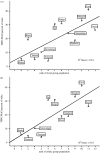More 'altruistic' punishment in larger societies - PubMed (original) (raw)
Comparative Study
More 'altruistic' punishment in larger societies
Frank W Marlowe et al. Proc Biol Sci. 2008.
Abstract
If individuals will cooperate with cooperators, and punish non-cooperators even at a cost to themselves, then this strong reciprocity could minimize the cheating that undermines cooperation. Based upon numerous economic experiments, some have proposed that human cooperation is explained by strong reciprocity and norm enforcement. Second-party punishment is when you punish someone who defected on you; third-party punishment is when you punish someone who defected on someone else. Third-party punishment is an effective way to enforce the norms of strong reciprocity and promote cooperation. Here we present new results that expand on a previous report from a large cross-cultural project. This project has already shown that there is considerable cross-cultural variation in punishment and cooperation. Here we test the hypothesis that population size (and complexity) predicts the level of third-party punishment. Our results show that people in larger, more complex societies engage in significantly more third-party punishment than people in small-scale societies.
Figures
Figure 1
Minimum acceptable (non-punished) offers by (a) local group population (_ρ_=0.727, _p_=0.007, _n_=12) and (b) ethnic group population (_ρ_=0.764, _p_=0.006, _n_=11). (b) Has only 11 societies because ethnic group could not be calculated (or reliably identified) for Sanquianga. We used the Hadza MAO reported in the previous Science article (Henrich et al. 2006), excluding several players who probably did not understand the TPPG, the MAO drops from 5.65 to 0 (Marlowe in press), making all the associations reported here even stronger.
Similar articles
- Cross-societal variation in norm enforcement systems.
Molho C, De Petrillo F, Garfield ZH, Slewe S. Molho C, et al. Philos Trans R Soc Lond B Biol Sci. 2024 Mar 11;379(1897):20230034. doi: 10.1098/rstb.2023.0034. Epub 2024 Jan 22. Philos Trans R Soc Lond B Biol Sci. 2024. PMID: 38244602 Review. - The 'spiteful' origins of human cooperation.
Marlowe FW, Berbesque JC, Barrett C, Bolyanatz A, Gurven M, Tracer D. Marlowe FW, et al. Proc Biol Sci. 2011 Jul 22;278(1715):2159-64. doi: 10.1098/rspb.2010.2342. Epub 2010 Dec 15. Proc Biol Sci. 2011. PMID: 21159680 Free PMC article. - [A test of the strong reciprocity model: relationship between cooperation and punishment].
Li Y, Yamagishi T. Li Y, et al. Shinrigaku Kenkyu. 2014 Apr;85(1):100-5. doi: 10.4992/jjpsy.85.100. Shinrigaku Kenkyu. 2014. PMID: 24804436 Japanese. - Does dishonesty really invite third-party punishment? Results of a more stringent test.
Konishi N, Ohtsubo Y. Konishi N, et al. Biol Lett. 2015 May;11(5):20150172. doi: 10.1098/rsbl.2015.0172. Biol Lett. 2015. PMID: 25994011 Free PMC article. - Punishment and spite, the dark side of cooperation.
Jensen K. Jensen K. Philos Trans R Soc Lond B Biol Sci. 2010 Sep 12;365(1553):2635-50. doi: 10.1098/rstb.2010.0146. Philos Trans R Soc Lond B Biol Sci. 2010. PMID: 20679108 Free PMC article. Review.
Cited by
- Why cultural distance can promote - or impede - group-beneficial outcomes.
Beheim BA, Bell AV. Beheim BA, et al. Evol Hum Sci. 2024 Mar 11;6:e14. doi: 10.1017/ehs.2024.8. eCollection 2024. Evol Hum Sci. 2024. PMID: 38516367 Free PMC article. - Cross-societal variation in norm enforcement systems.
Molho C, De Petrillo F, Garfield ZH, Slewe S. Molho C, et al. Philos Trans R Soc Lond B Biol Sci. 2024 Mar 11;379(1897):20230034. doi: 10.1098/rstb.2023.0034. Epub 2024 Jan 22. Philos Trans R Soc Lond B Biol Sci. 2024. PMID: 38244602 Review. - Culture and group-functional punishment behaviour.
Espín AM, Brañas-Garza P, Gamella JF, Herrmann B, Martín J. Espín AM, et al. Evol Hum Sci. 2022 Aug 1;4:e35. doi: 10.1017/ehs.2022.32. eCollection 2022. Evol Hum Sci. 2022. PMID: 37588896 Free PMC article. - Punishment: one tool, many uses.
Raihani NJ, Bshary R. Raihani NJ, et al. Evol Hum Sci. 2019 Nov 12;1:e12. doi: 10.1017/ehs.2019.12. eCollection 2019. Evol Hum Sci. 2019. PMID: 37588410 Free PMC article. Review. - Norm violations and punishments across human societies.
Garfield ZH, Ringen EJ, Buckner W, Medupe D, Wrangham RW, Glowacki L. Garfield ZH, et al. Evol Hum Sci. 2023 Apr 13;5:e11. doi: 10.1017/ehs.2023.7. eCollection 2023. Evol Hum Sci. 2023. PMID: 37587937 Free PMC article.
References
- Bernhard H, Fischbacher U, Fehr E. Parochial altruism in humans. Nature. 2006;442:912–915. doi:10.1038/nature04981 - DOI - PubMed
- Boone J.L. Competition, conflict, and the development of social hierarchies. In: Smith E.A, Winterhalder B, editors. Evolutionary ecology and human behavior. Aldine de Gruyter; New York, NY: 1992. pp. 301–337.
- Boyd R, Richerson P.J. The evolution of reciprocity in sizeable groups. J. Theor. Biol. 1988;132:337–356. doi:10.1016/S0022-5193(88)80219-4 - DOI - PubMed
- Boyd R, Gintis H, Bowles S, Richerson P.J. The evolution of altruistic punishment. Proc. Natl Acad. Sci. USA. 2003;100:3531–3535. doi:10.1073/pnas.0630443100 - DOI - PMC - PubMed
- Ensminger, J. et al Submitted. Fairness and punishment in cross-cultural perspective
Publication types
MeSH terms
LinkOut - more resources
Full Text Sources
